 Petzlover
Petzlover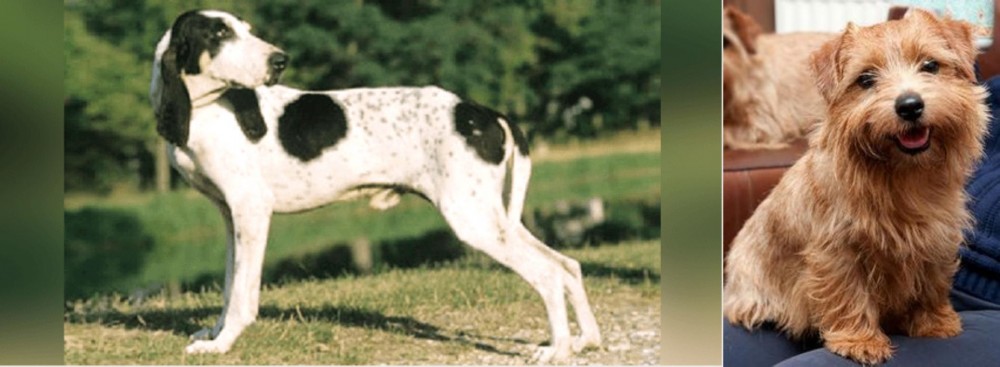 Ariegeois is originated from France but Norfolk Terrier is originated from United Kingdom. Ariegeois may grow 32 cm / 13 inches higher than Norfolk Terrier. Ariegeois may weigh 21 kg / 47 pounds more than Norfolk Terrier. Both Ariegeois and Norfolk Terrier has almost same life span. Both Ariegeois and Norfolk Terrier has almost same litter size. Ariegeois requires Low Maintenance. But Norfolk Terrier requires Moderate Maintenance
Ariegeois is originated from France but Norfolk Terrier is originated from United Kingdom. Ariegeois may grow 32 cm / 13 inches higher than Norfolk Terrier. Ariegeois may weigh 21 kg / 47 pounds more than Norfolk Terrier. Both Ariegeois and Norfolk Terrier has almost same life span. Both Ariegeois and Norfolk Terrier has almost same litter size. Ariegeois requires Low Maintenance. But Norfolk Terrier requires Moderate Maintenance
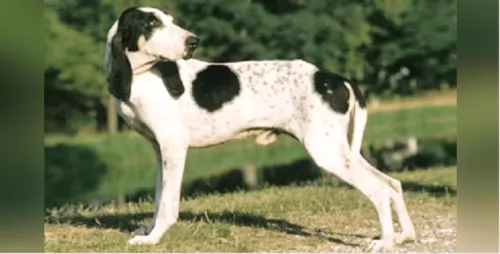 The Ariegeois is a fairly new breed, believed to have originated in France in 1912. As a scent hound, it is a blend of 3 French scent hounds - Grand Gascon-Saintongeois, Grand bleu de Gascon and the Briquet.
The Ariegeois is a fairly new breed, believed to have originated in France in 1912. As a scent hound, it is a blend of 3 French scent hounds - Grand Gascon-Saintongeois, Grand bleu de Gascon and the Briquet.
Just to show you how ancient these breeds are, the Grand bleu were thought to have been brought to France by an ancient civilization, the Phoenicians, who traded wares and dogs. The Briquet is native to southern France but they have been used as hunting dogs as far back as pre-Roman times.
As the breeds mixed, the Ariegeois came about. A popular pack dog emerged with an excellent sense of smell that would stand the dog in good stead for hunting. Today, while still fairly uncommon beyond French borders, the dog is highly regarded for its extraordinary hunting abilities and his loyal, affectionate nature towards his human companions.
 It was in the 1880s that a working terrier was developed in eastern England. The Norfolk Terrier was developed by crossing local terrier-like dogs with the Irish Terrier breed as well as small red terriers.
It was in the 1880s that a working terrier was developed in eastern England. The Norfolk Terrier was developed by crossing local terrier-like dogs with the Irish Terrier breed as well as small red terriers.
Known first as the Cantab Terrier and then later as the Trumpington Terrier, the name changed further but in 1932, the Norwich was accepted into the English Kennel Club and the first written standard was created.
The Norfolk Terrier was recognized by the United Kennel Club in 1979. It has gained recognition as an independent breed but is a variety of the Norwich Terrier, distinguished from it by having floppy ears and not erect ears. Both the Norfolk- and Norwich are the smallest of the working terriers.
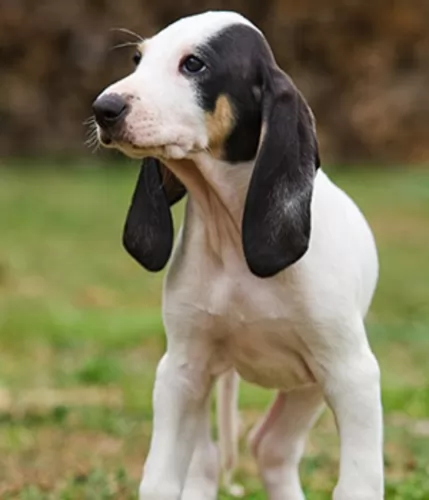 The amicable-looking medium-sized Ariegeois dog, also known as the Ariege Hound, has a lean, muscled body. This dog breed isn’t just suitable as as working breed, but his kind face tells you he has a good temperament and he makes for an affectionate family pet and friend as well.
The amicable-looking medium-sized Ariegeois dog, also known as the Ariege Hound, has a lean, muscled body. This dog breed isn’t just suitable as as working breed, but his kind face tells you he has a good temperament and he makes for an affectionate family pet and friend as well.
The Ariegeois gets along well with children in the family. Gentle and patient, you want to teach your children to also be gentle, patient and kind around this affectionate canine. Early socialization and training, as with any dog breed, will be important for this energetic dog, and training will make him a wonderful family pet.
With their trim, athletic build, deep chest and slightly forward lean similar to that of a Pointer dog, the scenthound’s white coat with black markings is short and smooth.
One of the more noticeable features of the dog is his long ears which are lovely and soft to touch. With his dark brown, soulful eyes, his black nose and slightly curved tail, the Ariegeois has a deep, throaty bark.
 The Norfolk Terrier is a small purebred dog, standing at 23 to 25cm in height and weighing roughly between 4.5kg and 6kg. The dog has a wire-haired coat which can be in different colors such as wheaten, red, black and grey or grizzle.
The Norfolk Terrier is a small purebred dog, standing at 23 to 25cm in height and weighing roughly between 4.5kg and 6kg. The dog has a wire-haired coat which can be in different colors such as wheaten, red, black and grey or grizzle.
The hair on his head and ears is shorter and smoother and he has longer whiskers and eyebrows. The chest is deep, the front legs are short and straight and the tail has always been docked to half its length but left long these days. The tail is set high and carried erect.
Norfolks are feisty, fearless dogs with an independent streak. They’re gentle though, and when it comes to being a companion dog, they get on well with children and other pets. They thrive on their human family’s companionship and wouldn’t do well at all if they were constantly left outside.
They’re not yappy dogs but will bark occasionally so he can sound the alarm if strangers approach.
This little dog is able to live in the city or the countryside, but just because he is little, you can’t neglect his exercise needs. He will most certainly need to be exercised every day and taken for walks as he is an energetic, lively dog. He is intelligent too and easy to train and socialize, turning him into such an obedient, pleasurable pet.
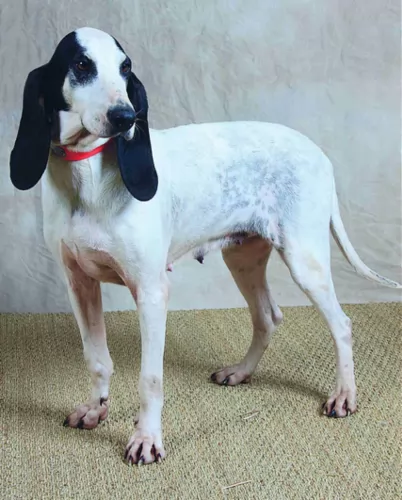 Your wonderful Ariegeois wants to be your lifelong companion, and you can expect all the wonderful characteristics to be evident in this canine if you buy him from a reputable breeder. When you bring him home, make sure he has a warm, dry, comfortable sleeping area, and in exchange for this provision he will be your loyal, devoted friend.
Your wonderful Ariegeois wants to be your lifelong companion, and you can expect all the wonderful characteristics to be evident in this canine if you buy him from a reputable breeder. When you bring him home, make sure he has a warm, dry, comfortable sleeping area, and in exchange for this provision he will be your loyal, devoted friend.
Spayed or Neutered saves you from Unwanted Puppies
If you don’t intend your Ariegeois becoming a parent have your dog spayed or neutered by 6 months of age.
Your Ariegeois is intelligent and easy to train and can be guaranteed to be your best friend and will be your loyal companion through thick and thin. In exchange for this priceless friendship, you need to be a responsible dog owner to ensure his health and happiness.
 Fearless and brave, the Norfolk Terrier promises to be a wonderful companion.
Fearless and brave, the Norfolk Terrier promises to be a wonderful companion.
They're social, loving dogs and want to be part of the household. He is lively and active too and wants to be included in your walks and your games. He loves nothing more than to be running across a field after a ball.
They’re such amicable pets that they make great dogs for first-time dog owners. Let him into your heart and your home – he makes such a splendid pet – that once you’ve had one, you’ll realize you can never be without such a wonderful pet and companion again.
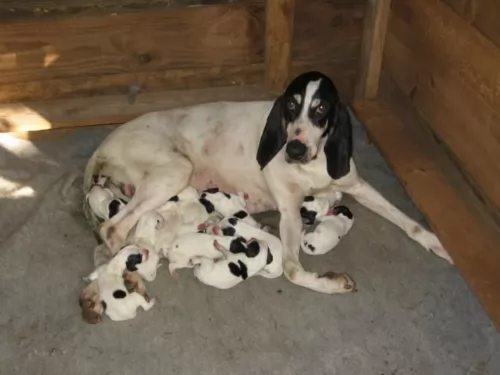 There are a number of illnesses that are common to all dog breeds. Some of the more common dog illnesses are -
There are a number of illnesses that are common to all dog breeds. Some of the more common dog illnesses are -
No Standard Health Problems – Get Puppy Vaccinations
There are no specific health problems linked to the Ariegeois Dog but he will still need to get his regular puppy vaccinations -
 The life expectancy of your Norfolk Terrier is 8 to 14 years, but there are some who have received excellent care and who have reached 17 years of age.
The life expectancy of your Norfolk Terrier is 8 to 14 years, but there are some who have received excellent care and who have reached 17 years of age.
Just as with any other dog, they are prone to common dog illnesses, and these can include dental issues and mitral valve disease. They also are prone to hip dysplasia, and according to the Orthopedic Foundation for Animals (OFA) they are known for problematic hips.
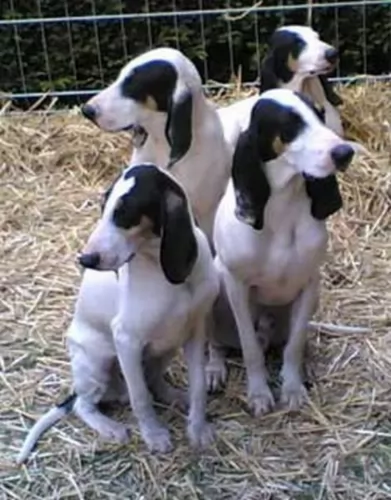 The Ariegeois is a relatively low maintenance dog and his short coat will require a good brush at least once a week. You don’t have to bath him often as this strips natural oils away that make his coat shiny and glossy. Check those long ears and make sure that no leaves, grass and dirt are lodged deep within the ears.
The Ariegeois is a relatively low maintenance dog and his short coat will require a good brush at least once a week. You don’t have to bath him often as this strips natural oils away that make his coat shiny and glossy. Check those long ears and make sure that no leaves, grass and dirt are lodged deep within the ears.
There are thousands of options for dog foods and the first step is to chat to your veterinarian about the best food for your to meet his nutritional needs during each stage of his life. It is difficult to determine diet quality for you dog from the label.
Wet or dry dog food, it is important to have high quality ingredients from a dog food manufacturing company that has the expertise to produce dog food that meets your pet’s nutritional needs. Protein is highly important for your pet and many dog owners make their own dog food. Raw meat is imperative for the health of your dog, but before switching to a raw diet, chat to your veterinarian. Do research on different brands - there are good and bad brands and your pet needs to be protected from false claims. Always make sure your pet has access to fresh, cool, clean drinking water.
Your Ariegeois will need some exercise if you want him to maintain his lean, muscular shape. In order for him to stay in shape and to avoid boredom, take him on walks, throw a ball for him, and your reward will be his bright eyes and wagging tail.
 The Norfolk Terrier’s hard, wiry, straight coat requires being hand stripped about twice a year by hand or with a stripping knife. The paws will also need to be trimmed.
The Norfolk Terrier’s hard, wiry, straight coat requires being hand stripped about twice a year by hand or with a stripping knife. The paws will also need to be trimmed.
It is recommended to keep the hair short around the anus for hygienic purposes and the tail itself will need to be stripped.
The Norfolk doesn’t shed his coat naturally, and the hair keeps growing, making the dog uncomfortable and ungroomed looking. The dog will certainly need to have his hair kept away from around the eyes.
If you don’t want to strip your dog, there are people who take their dogs to professional groomers, but then this professional grooming makes it that the texture of the dog’s coat changes from wiry to soft.
Small dogs are prone to dental problems, so check your dog’s teeth regularly. A bad tooth can play havoc with your dogs general health.
As with any other dog, the Norfolk Terrier will do well on high-quality kibble, specially formulated for small dog breeds. For a tasty treat, boil some chicken and vegetables such as sweet potato, carrots and spinach in a pot, chop them up and add to his kibble with some brown rice and pasta. A tiny bit of raw meat added in occasionally is all this little dog needs to stay healthy and content.
Don’t ‘treat’ him by giving him chocolates, chips and peanuts. You will upset his stomach. Dogs do best on simply, healthy, tasty diets such as mentioned above. Make sure he has a constant supply of fresh, cool water.